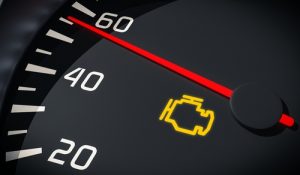 When your check engine comes on, it can cause anxiety and worry. While the unknown issue might cause stress. The reason your engine light is on could be a minor thing, or it could be a big one. Several factors including the age of your vehicle, mileage, and how well you’ve maintained it up until the point that the light comes on. Ignoring the check engine light will almost inevitably result in further problems down the road. Here in this article, we’ll explain what two different lights indicate as well as give examples of some of the seven most common reasons why your light is on.
When your check engine comes on, it can cause anxiety and worry. While the unknown issue might cause stress. The reason your engine light is on could be a minor thing, or it could be a big one. Several factors including the age of your vehicle, mileage, and how well you’ve maintained it up until the point that the light comes on. Ignoring the check engine light will almost inevitably result in further problems down the road. Here in this article, we’ll explain what two different lights indicate as well as give examples of some of the seven most common reasons why your light is on.
The Meaning of Two Different Lights
For most vehicles, there are two different kinds of check engine lights – a flashing light and a light that stays on consistently? Here’s what these two lights mean.
-
Consistent Light
When the check engine light comes on and stays on consistently, there is an issue with your engine that should be addressed soon. While this issue isn’t immediate, it should be addressed as soon as you can manage to do so. The check engine light can come on if your gas cap is loose, so don’t panic if you see it. Below are some other reasons why your light might come on and stay on.
-
Flashing Light
If your check engine light is flashing, there is a serious issue. The most common cause of a flashing check engine light is usually that the engine is misfiring. Continuing to drive while the engine is misfiring could cause irreversible damage, so be sure to pull over immediately if this is the case. Turn off the engine and do not drive again when this happens. Call a tow truck and get the vehicle to a technician immediately.
Check Engine Light – Common Reasons
-
Loose or Damaged Gas Cap
A loosened or damaged gas cap is a common reason for your check engine light going on, and it’s also the easiest to fix. A new gas cap is inexpensive, and of course, tightening the cap is quick and easy.
-
Issues With Catalytic Converter
The catalytic converter converts carbon monoxide into carbon dioxide. An issue with the converter usually arises if you neglect its maintenance.
-
Mass Airflow Sensor
The mass airflow sensor ensures the efficiency of an engine by measuring how much air the engine takes in.
-
Oxygen Sensor
The oxygen sensor measures how much oxygen is released by your exhaust. A damaged or malfunctioning sensor will cause a loss in MPG.
-
Damaged Spark Plug Wires
Spark plug wires deteriorate with age due to extreme heat or cold, as well as elements inside of your engine like coolant, grease, and oil. A common sign of a damaged spark plug wire is if you notice a loss in acceleration, engine power, and performance, or a decrease in fuel efficiency.
Otto’s – Over Two Decades of Experience with European Supercars
While the above common issues with check engine lights hold true no matter what vehicle you drive, European supercars and luxury vehicles are different from common motorist vehicles. These world-class machines require knowledge and expertise that don’t exactly apply to common everyday cars. The European supercar and luxury vehicle experts at Otto’s have over two decades of working on all makes and models. Call us today for an appointment.